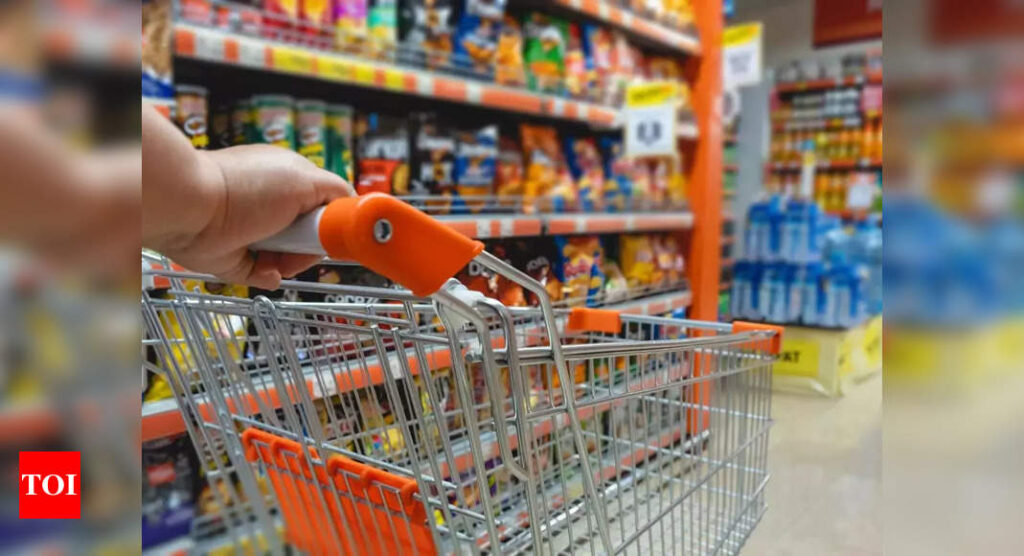FMCG firms worry over high inflation, squeezing urban market; hint price hike

NEW DELHI: Leading FMCG companies reported a decline in margins in the September quarter on account of higher input costs and food inflation, which ultimately slowed down the pace of urban consumption. Rising prices of commodity inputs such as palm oil, coffee and cocoa were also accentuated and some FMCG firms have hinted at a price hike.
HUL, Godrej Consumer Products Ltd (GCPL), Marico, ITC, and Tata Consumer Products Ltd (TCPL) have expressed concerns over squeezing urban consumption, which according to industry experts forms 65-68 per cent of FMCG total sales.
“We think this is a short-term hit and we will recover the margins through judicious price increase and stabilising of costs,” said GCPL Managing Director and CEO Sudhir Sitapati in a Q2 earning statement.
GCPL, makers of Cinthol, Godrej No 1, HIT had a steady quarter given the headwinds of oil costs and tough consumer demand in India and its standalone EBITDA margin was lower, caused entirely by high inflation in palm oil.
The rural markets, which were earlier lagging behind, continued their growth journey ahead of urban. Besides, FMCG players reported growth from premium products and from sales through quick-commerce channels.
Another FMCG maker Dabur India also said the demand environment was challenging in the September quarter marked by “high food inflation and a resultant squeeze in urban demand.”
The maker of Dabur Chyawanprash, PudinHara and Real juice reported a decline of 17.65 per cent in its consolidated net profit to Rs 417.52 crore and revenue from operations slipped 5.46 per cent to Rs 3,028.59 crore.
Recently, Nestle India Chairman & Managing Director Suresh Narayanan also raised concerns over decline and said “middle segment” is under pressure as high food inflation continues to cripple household budgets.
“It is extremely clear that the market is facing muted demand. The growth in F&B sector, which used to be in double digits a couple of quarters ago, is now down to 1.5-2 per cent,” he said.
Over the rise of food inflation, Narayanan said there is a “sharp uptick” in prices of fruits and vegetables and oil prices.
“This could lead to an increase in prices if raw material costs become unmanageable for companies. We are ourselves facing a difficult situation as far as coffee and cocoa prices are concerned,” he said.
Nestle India, which owns brands such as Maggi, Kit Kat, and Nescafe also reported a marginal decline of 0.94 per cent and its domestic sales growth was at 1.2 per cent.
Narayanan also pointed out that tier-1 and below towns and rural also seem to be reasonably stable. However, “pressure points” are coming from mega cities and metros.
TCPL MD & CEO Sunil D’Souza also said urban has softened and has an impact on consumer spending in urban areas.
“My hypothesis is probably food inflation is higher than what we think it is and the impact is far higher,” said D’Souza in the earnings call for the September quarter.
HUL CEO & MD Rohit Jawa said the market volume growth trajectory remained muted in this quarter. At an MAT (moving annual total) level, total FMCG volume growth has slowed down slightly in recent months.
“The pattern is quite clear that urban growth has trended down in the recent quarters or quarter and rural has continued to grow gradually and has now for the past few quarters been ahead of urban, and also continues to be ahead of urban this time,” Jawa said in an earnings call.
HUL, which owns power brands such as Surf, Rin, Lux, Pond’s, Lifebuoy, Lakme, Brooke Bond, Lipton and Horlicks, reported a 2.33 per cent decline in consolidated net profit.
Similarly, Marico also reported “rural growing at 2x the pace of urban” on a year-on-year basis. It also reported “higher input costs in the core portfolios”. Though it already had price hikes in the coconut oil portfolio and a favourable reversal in the pricing cycle in Saffola oils.
“In view of the higher-than-anticipated degree of inflation in copra prices and sharp import duty hike in vegetable oils, the company will focus on its stated revenue growth aspiration while remaining watchful on the margin front during the second half of the year,” it said.
ITC, which operates in the FMCG segment with brands such as Aashirvaad, Sunfeast, Bingo!, YiPPee reported marginal drop of 35 basis points in margins amidst inflationary headwinds in input costs.
It faced “subdued demand conditions” due to unusually heavy rains in parts of the country, high food inflation and sharp escalation in certain input costs during the quarter.







